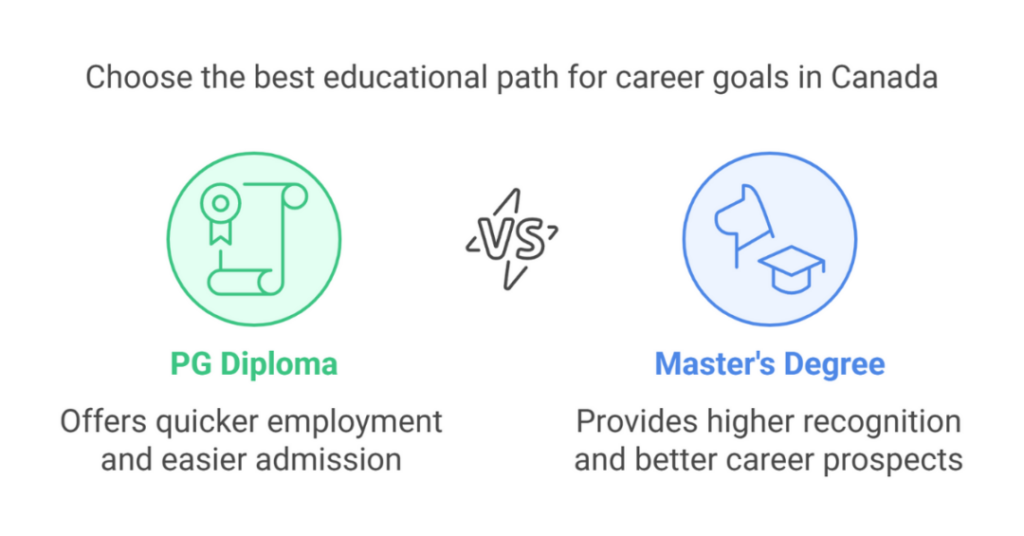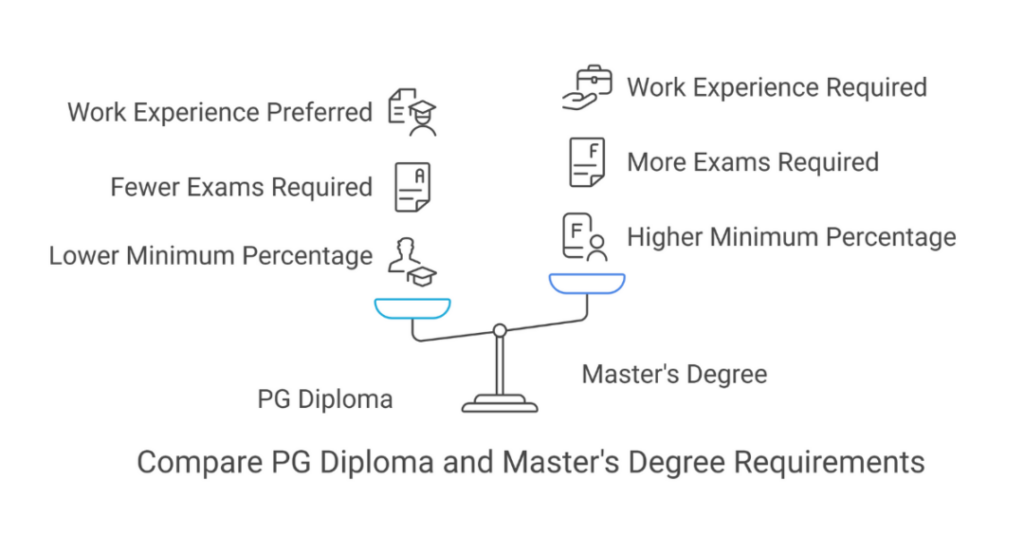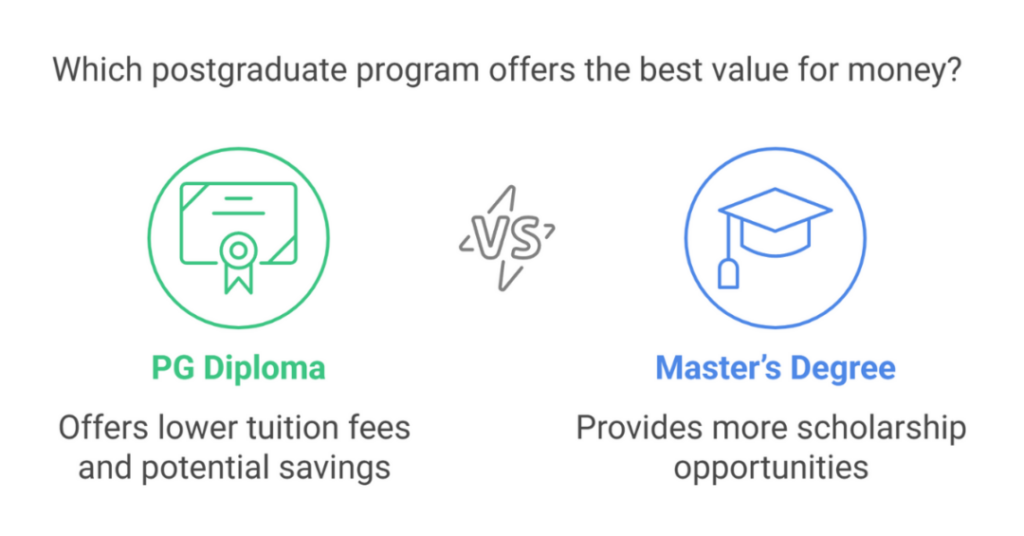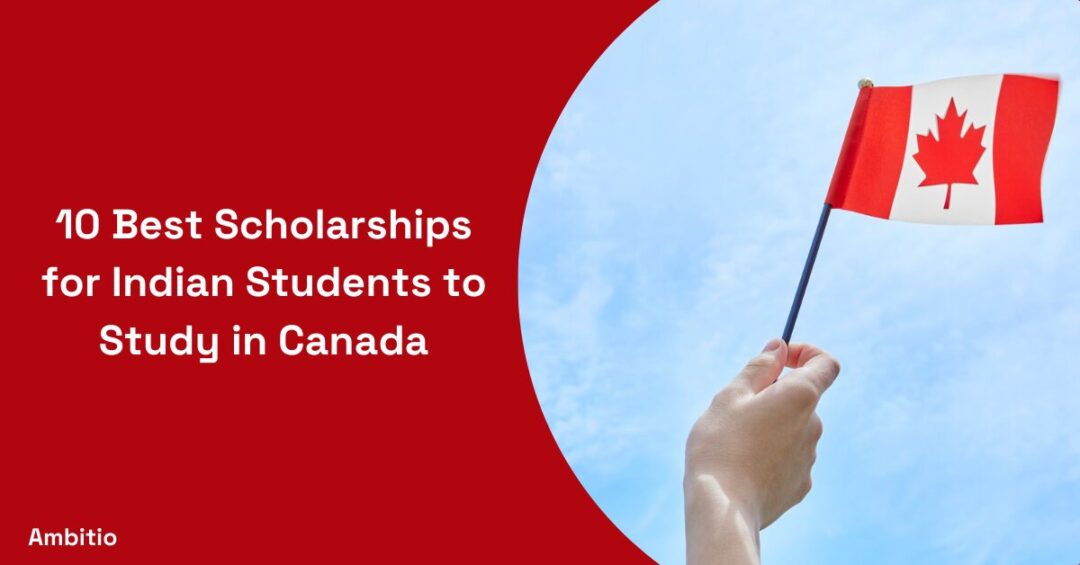21 May 2025
6 minutes read
What is the Difference Between PG Diploma and MS in Canada for an Indian Student?

Key Takeways
- Difference between PG Diploma and MS in Canada lies in academic depth—MS is a full-fledged degree, while PG Diploma is more skill-focused and shorter.
- Difference between PG Diploma and MS in Canada includes duration and cost—PG Diplomas are usually 1–2 years and more affordable than MS programs.
- Difference between PG Diploma and MS in Canada affects PR chances—MS often carries higher immigration and job prospects compared to PG Diplomas.
More and more Indian students get trapped between a PG Diploma and a Master’s Degree while considering studying in Canada. Though both of them open gates for post-graduation prospects to study, work, and even settle in Canada, they serve different academic purposes and career objectives.
With so much hype surrounding the worth and value of a PG Diploma versus Masters, one can easily get lost. Do you take the affordability and shorter time frame of a PG Diploma or shoot higher with the greater prestige and intellectual depth of a Master’s Degree in Canada?
Let us guide you through the whole thing — from tuition and eligibility to work permit possibilities and best Canadian universities — so that you can make a well-informed choice.
What is a Postgraduate Diploma (PG Diploma)?
A Postgraduate Diploma, or PG Diploma in Canada, is an advanced academic qualification provided by numerous Canadian colleges and universities. It’s perfect for bachelor’s degree holders who want to upskill or transition to a new area of study without investing in a full-fledged program.
It’s like a rapid upgrade — a one-year course (sometimes two) with hands-on experience and practical skills. If you are a person who would like to get into the job market earlier or change direction in your career, a PG Diploma course in Canada is a very compelling option.
Not being equal to a master’s qualification in Canada, a PG diploma is still of great worth in terms of work exposure and employability.
Why Pursue a Post Graduate Diploma?
Fun fact: More than 70% of Indian students who complete a PG Diploma in Canada find employment within six months of graduation!

Here’s why a PG Diploma program might be your best option:
- Affordable option compared to a master’s degree
- Faster duration (usually 1 year to 2 years)
- Curriculum that is job-oriented and job-specific
- Simpler admission process and relaxed eligibility criteria
- Chances to secure a work permit and gain number of years of Canadian work experience
Top Universities for PG Diploma in Canada
Fun fact: Some Canadian colleges and universities offer over 500 PG Diplomas across various disciplines!
| Sl No | University Name |
|---|---|
| 1 | Humber College |
| 2 | Centennial College |
| 3 | George Brown College |
| 4 | Conestoga College |
| 5 | Seneca College |
These colleges in Canada offer PG diploma courses that are practical, affordable, and career-focused — perfect for those looking to get a job fast.
What is a Masters Degree?
A Canadian Master’s Degree is a research-oriented academic credential earned after completing a bachelor’s degree. It’s a degree and not some diploma — that is, it carries more academic stature globally.

Master’s degrees typically take 1.5 to 2 years to complete and entail students completing at least 120 credits. Whether you are thinking of pursuing a Master’s in Data Science, Engineering, Business (MBA), or Humanities, Canadian institutions have ample options for programs in Canada.
The master’s degree in Canada provides you the freedom to delve into your field of interest, conduct research projects, and pave the way for doctoral studies or career positions of specialized nature. In contrast to a PG diploma course, the latter is a complete degree with greater worth than a diploma.
Why Pursue a Study Abroad Masters Degree?
Fun fact: Graduates from a master’s program in Canada earn up to 40% more than PG diploma holders!
Benefits of pursuing a master’s in Canada include:
- Globally recognized credentials that add worth of your degree
- Greater chances of PR in Canada
- Access to high-quality research and academic resources
- Eligibility for post-graduate work permits for up to 3 years
- Better job opportunities and higher average salary
Top Universities for Masters Degree in Canada
Fun fact: Canadian universities dominate global rankings for postgraduate education!
| Sl No | University Name |
| 1 | University of Toronto |
| 2 | University of British Columbia |
| 3 | McGill University |
| 4 | University of Alberta |
| 5 | University of Montreal |
These universities in Canada offer comprehensive master’s programs that are internationally acclaimed.
PG Diploma vs Masters in Canada: An Overview for Indian Students
Fun fact: Confused between pursuing PG Diploma or a Master’s Degree? You’re not alone — it’s the most Googled query by Indian students planning to study in Canada!

Here’s what sets them apart:
- PG Diploma is shorter and cheaper, while a Master’s is longer and more in-depth
- Master’s has higher global recognition and academic value
- PG Diploma offers quicker employment opportunities
- Master’s leads to better salary and chances of PR
- Eligibility and admission are easier for PG diploma holders
| Factor | PG Diploma | Master’s Degree |
| Duration | 1–2 years | 1.5–2 years |
| Cost of Studying | CAD 7,000 – CAD 20,000/year | CAD 18,000 – CAD 35,000/year |
| Recognition | Not equivalent to masters | Globally recognized |
| Work Permit | Up to course duration | Up to 3 years |
| PR Pathway | Possible but indirect | Easier and direct |
Eligibility Criteria for PG Diploma vs Masters in Top Universities in Canada
Fun fact: You don’t always need a GRE or GMAT for a PG Diploma in Canada!
Key differences include:
- PG Diploma requires a bachelor’s degree with 55%+
- Master’s often requires 70%+ in bachelor degree holders
- GRE/GMAT may be needed for master’s in leading universities in Canada
- IELTS/TOEFL is mandatory for both
- Work experience boosts chances in both cases but the experience required for PG Diploma is not equivalent to that of masters.
| Requirement | PG Diploma | Master’s Degree |
| Minimum Percentage | 55%+ | 70%+ |
| Exams Required | IELTS/TOEFL | IELTS/TOEFL, GRE/GMAT (some) |
| Work Experience | Preferred | Often Required (2–3 years of work experience) |
| Statement of Purpose | Not always required | Mandatory |
| Letters of Rec. | Usually not needed | Required (2–3) |
PG Diploma and Masters: Tuition Fees (Cost of Studying) in Canada
Fun fact: Choosing a PG Diploma can save you up to CAD 15,000 per year!
Here’s how the fee compares:
- PG Diploma costs CAD 7,000 to CAD 20,000 per year
- Master’s ranges from CAD 18,000 to CAD 35,000 per year
- Scholarships are more available for master’s students
- Living costs are similar for both
- Part-time work helps offset tuition
| Type | Fee (Yearly) |
| PG Diploma | CAD 7,000 – CAD 20,000 |
| Master’s Degree | CAD 18,000 – CAD 35,000 |
Work Permit and Jobs in Canada for Indian Students
Fun fact: Canada is home to more than 6 lakh international students, many of whom get a job within six months of graduation!
Work and job prospects:
- PG Diploma allows a work permit equal to course duration
- Master’s graduates get up to 3-year work permits
- Graduates from University of Toronto, UBC, McGill, Conestoga College, Seneca, Humber, Centennial, and George Brown enjoy strong job placements
- Job options range from internships to full-time employment
- Work permit in Canada is crucial for PR eligibility
PG Diploma or Masters Degree: Which one is Better for Indian Students?
Fun fact: Most Indian students choose a PG Diploma in Canada as a stepping stone to permanent residency.
Here’s how to decide:
- If budget is tight, go for PG Diploma from colleges for PG diploma
- If long-term value matters, opt for a master’s from top universities like McGill, UofT, UBC, Alberta, or Montreal
- PG Diploma is easier to get into, especially for bachelor degree holders with average scores
- Master’s is worth pursuing if you want to go into research or academics
- Choose diploma in Canada if your goal is quick job placement
Conclusion
Choosing between a PG Diploma and a Master’s in Canada isn’t merely a question of longevity or price tag — it’s a matter of your goals, finances, and long-term objectives.
A PG diploma program in Canada provides an instant, affordable path to work, while a master’s in Canada provides substantial academic and professional benefit. For Indian students aspiring to pursue studies in Canada, both have the potential.
Whether you choose a diploma or a master’s, ensure that the course in Canada aligns with your area of study and career aspirations. With Canadian colleges and universities covering anything from an advanced diploma to an MBA, the scope to study in Canada is limitless.
Pick wisely with the expert guidance at Ambitio, and your Canadian adventure can take you not only to a degree — but a future.
FAQs
What is the main difference between PG Diploma and MS in Canada?
The main difference between PG Diploma and MS in Canada is that an MS is a full master’s degree with a strong academic and research focus, while a PG Diploma is a shorter, skills-based program.
Does the difference between PG Diploma and MS in Canada affect job opportunities?
Yes, the difference between PG Diploma and MS in Canada impacts job prospects—MS graduates may qualify for higher-level roles, while PG Diploma holders may find quicker entry into technical jobs.
How does the difference between PG Diploma and MS in Canada impact PR eligibility?
The difference between PG Diploma and MS in Canada affects PR pathways, as an MS usually earns more Comprehensive Ranking System (CRS) points in Express Entry.
Is the tuition cost part of the difference between PG Diploma and MS in Canada?
Absolutely. The difference between PG Diploma and MS in Canada includes tuition—PG Diplomas cost less, while MS programs can be significantly more expensive.
Can the difference between PG Diploma and MS in Canada influence international recognition?
Yes, the difference between PG Diploma and MS in Canada can affect global recognition, as a master’s degree often carries more academic prestige than a PG Diploma.
Does the difference between PG Diploma and MS in Canada matter for career growth?
The difference between PG Diploma and MS in Canada plays a major role in long-term career growth, with MS degrees often opening doors to research or leadership positions.
Is the course duration a part of the difference between PG Diploma and MS in Canada?
Definitely. The difference between PG Diploma and MS in Canada includes course duration—PG Diplomas typically take 1–2 years, while MS programs usually last 2 years.

You can study at top universities worldwide!
Get expert tips and tricks to get into top universities with a free expert session.
Book Your Free 30-Minute Session Now! Book a call now




























